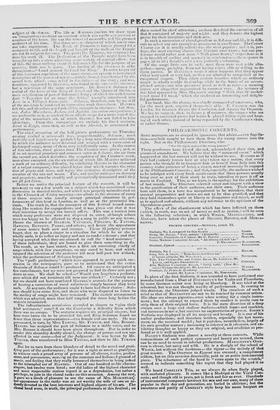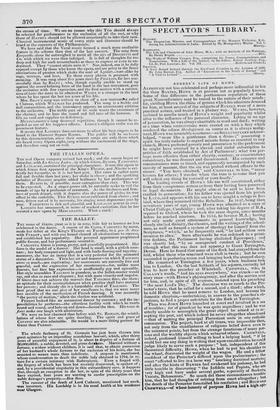PHILHARAIONIC CONCERTS.
SOME managers are so steeped in ignorance, that advice—even flagella. tion—availeth nought to turn them from the wrong course into the right. Nut so the Philharmonic Directors, who
sae the rigLt, and yet the Wrung pur.ne."
These gentlemen have kissed the rod, acknowledged their sins, and promised amendment. We believe that the " untoward event" which happened at the last concert will not be without its use. It seems as if they had (nobody knows how or why) taken up a notion, that every person who thought lit to transport him or herself from Italy into this country under pretence of being a singer, must of necessity be engaged at the PhilharmonieConcerts ; and that, especially, the audience wished to he indulged with every fresh cantitenaccia that these persons usually bring over as part of their stock in trade, intending to pass it off as music in England. This, as we learn, is the apology for the exhibition of last month. The Directors selected songs and singers with a view to the gratification of their audience, not their own. Their audience have told them, in a tone too unequivocal to be mistaken, that their musical propensities and tastes are not to be thus gratified, and that they hold themselves quite at liberty to disapprove and reject, as well as to applaud and admire, without any reference to the opinions of the Operahouse-goers. The effect of the chastisement which has been inflicted on them (which, in truth, was an act of mercy as well as justice,) will be seen in the following selection ; in which Wcamt, MESDELsSnTrN, and Mozart; have taken the places of 13ELLINI, ROSSINI, and :Macs.
DANTE.
FOURTH CONCERT—MONDAY, APRIL 11.
ACT I.
Sinfonia. No 2, compo.ed for this Society SPORR. Scene. Mr. liALFF. " Pace, ardent i (Efiryanthe) Wencs. Concerto, Pianoforte. in C minor, Mr. C. Purrt:a MOZART. `Rena, Madame CARA DOM ALLAN, " All Morita eta 11.41 'Ito" F. MENDEIAMOIN It ATITROLDT.
Overture, Egmont BEETHOYEX.
ACT IL
Sinfonia, No. 1 HAYDN. Song% Mrs. A. SHAW, " Make haste todeliva me." (;Taman obligate, Mr. W r.r.mAN) NEURONIC Trio, Two Violoncello:4 and Contra Ba-so, Mr. LINDLEY, Mr Lunen, and Signor pRAGOKETTI CORELLI. Aria. Madame eAHADORI ALLAN, Rani, hint'," (IH.n Gi,;- ranni) Violoncello ohligato. Mr. Lt a "Lk y MozAiur. Overture, Le Pr'nce de Ibmkoerg MAHSCHNER.
Leader, Mr. LAMER -touductor, Mr. Mosenstis
In place of the first Sinfonia, it was intended to have performed one manufactured from a Duet of IlEurtiovEN's for Violin and Pianoforte,. by some German writer now living at Hamburg. It was tried at the rehearsal, but was riot thought worthy of performance. In coming to this decision, the Directors judged wisely. The creations of such a mind as that of BF.I:TliovEN are not to be touched by common artists. His ideas are always gigantic—even when writing for a single instru- ment; but the attempt to expand them by another is pretty sure to strip them of their original force. It is the mere diversion of a deep• stream over a large and shallow surface—which foams and sparkles, and increases in but receives no augmentation of power. SPOHR'S Sinfonia was displayed in all its majesty and beauty. It is one of his earlier productions, and therefore written, especially the last move- ment, on the received model ; but it partakes, nevertheless, largely of his own peculiar manner ; increasing in interest as it advances, and ex- hibiting thoughts as happy as they are original, and erudition as pro- found as it is well applied. HAYDN'S Sinfonia was almost a novelty at these concerts. While compositions of such perfect symmetry and beauty are unused, there can be no need to resort to inferior productions. AIARSCHNER'S Over- ture is clever, but noisy and wild. He is a disciple of the school of WEBER, but without the freshness—the vigour— the melody of that great master. The Overture to Egmont was encored ; a compliment seldom, but on this occasion deservedly, paid to an entire instrumental piece. The reluctance of the band to "come again to the scratch," seemed to indicate something like regret that they had played it so
well.
We heard CORELLI'S Trio, as we always do when finely played, with unabated pleasure. It comes like a Madrigal at the Vocal Con- certs ; and though old in years, yet is fresh and fair as ever. Hundreds of instrumental composers between his aara and our own, many of them popular in their day and generation, are buried in oblivion ; but the sweetness and purity of CoRELtt'S style keep his name buoyant on
the stream of time. We see no reason why this Trio should always be selected for performance to the exclusion of all the rest, or why those of HANDEL should not be allowed occasionally to take their turn. Classical instrumental music of every style and character should be heard at the concerts of the Philharmonic.
We have said that the Vocal music formed a much more creditable feature in the scheme than that of the last concert. The song from Euryanthe alone far outweighed in merit all the airs of DONIZETTI and Co. with which we were then indulged. It is full of thoughts far too deep and high for such mountebanks as these to express or even to un- derstand. They "cannot attain unto it." Nor, indeed, can it be fully enjoyed except by those who know the opera, and are privy to the fierce alternations of passion which shake the soul of Lysiart—torn alike by -rage, revenge, and love. To these every phrase is pregnant with aliening. It was sung about five years since by PHILLIPS, far less suc-
• cessfully than by BALEE ; who, though equally unable to stand up against the overwhelming force of the band in the last movement, gave the recitative with fine expression, and the first motivo with a correct- ness of taste the more to be admired as WEBER is a stranger in the land where be has spent the last ten years of his life.
Mrs. Slum's song was written to show off a new instrumebt called a Clarone, which IVILLNIAN has produced. The song is a feeble and dull composition, and the instrument appears an unnecessary addition to the orchestra. The treble part of its scale wants the sweetness of the clarinet, and its bass the round and full tone of the bassoon. It fills no void and supplies no deficiency.
MENDELssouN's song deserved repetition, though it cannot be re- garded as one of his happiest efforts. LODER'S obligato violin was its prominent feature.
It seems that LAPORTE does not mean to allow his best singers to be heard in the Hanover Square Rooms. The public will be no losers by this determination, since their concert songs are only those which are heard every Opera night, sung without the excitement of the stage, and therefore sung not so well.



























 Previous page
Previous page